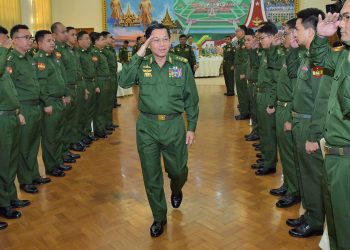I was a good prisoner. Prison authorities kept us political prisoners confined 23 hours a day in our tiny, dim, airless cells, deprived of all our rights. But I was that rare breed of prisoner—the one who was happy with their restrictions.
I had a reason to be.
During the 1990s I spent seven years, eight months and 25 days locked up in various prison cells of Myanmar’s military regime. That’s 2,825 days—or 67,800 hours.
I’ve been motivated to calculate my imprisonment in days and hours by the ongoing coronavirus pandemic, which has required people all over the world to self-isolate and stay at home. We don’t know how long we will be required to remain in isolation and distance ourselves from other human beings, or adhere to the nighttime curfews, travel restrictions and lockdowns imposed by our governments.
After a few months of this, however, many people are growing impatient with such a restricted life. Look at the many countries that have imposed tough penalties on those citizens who, chafing at being confined, defy the rules. Look at the United States, where some governors are lifting lockdowns under pressure from residents who can’t take it anymore, psychologically or economically.
It’s understandable; humans are highly social beings. Inevitably, there will be times in life when we can’t do what we want, or when our routines are disrupted. Now, our world is confronting one of those inevitable moments.
Prison forced me to face such a moment.
In prison, occasionally we experienced what we inmates referred to as a “golden age”. A “golden age” was basically a period when the restrictions were at their least draconian. Such periods occasionally occurred under more flexible and relaxed jail authorities.
During these “golden ages,” we were not locked up for 23 hours a day. We could spend hours (sometimes, say, from morning until late afternoon) outside our cells, walking around in the compound of our cellblock or visiting other cells within the compound. In prison, this is a great “freedom”, and all the political prisoners enjoyed staying outside or visiting each other to engage in conversation.
I chose not to indulge in this freedom, however. Instead, I “imprisoned” myself in my cell. Unlike other prisoners, I preferred confinement to the cell—to be required to spend many hours there—over the freedom to move around outside it.
As mentioned above, I had a reason: to read books in order to keep learning. Only reading books and news magazines, I was sure, would help me gain more knowledge, to catch up with the outside world and to learn the English language. I couldn’t read books outside the cell because reading any kind of book or document was strictly prohibited throughout my time of imprisonment. That’s why I liked being locked up. So I could read the whole day and night with no distractions.
The most apt description I can think of would be to call it a “double confinement”—an extra self-confinement within the confinement. Doubly confined, I kept to a strict timetable from wake-up time till bedtime, in which I managed to read more books and study more topics than I would have otherwise. That’s mostly what I did during my lengthy imprisonment—read religiously.
So, I was a “good” prisoner who was happy with the harsh restrictions. But my self-containment caused my fellow political prisoners to worry about my health. They said my habit of keeping myself mostly in the cell had caused me to become pale and feeble. Wanting to help, they pulled me out of the dim corner of my cell to force me to get some fresh air, stretch my limbs and “socialize” with them in the compound of our cellblock.
My “self-imprisonment” had a single aim: to defy the will of the dictatorship, which had thrown me into a dark cell in which my spirit was to be broken, my resilience was to be shattered and I was to be deprived of all knowledge.
My determination was two-fold. I didn’t merely want to survive the hardships of prison; I wanted to defeat the will of the dictatorship to break me physically, psychologically and spiritually. Today, as a free man, my “double confinement” achieved its aim: I have my life back.
Perhaps I unwittingly applied the “10,000 hours” theory put forward by Canadian journalist Malcolm Gladwell in his 2008 book “Outliers”. According to this theory, people need at least 10,000 hours of practice—in addition to talent—to achieve mastery in something. For me, the achievement was my defiance of the dictatorship, as I had not only survived physically and psychologically, but I had grown intellectually.
So, isolated and forced to stay at home by the coronavirus pandemic, what will become of us?
Now, it’s as if we are all stumbling through the dark, relying not on our eyesight but our imagination. (In fact, that’s how I came to see prison life—it’s a kind of walk in the dark; you have no idea where you are heading or where you will end up, as you are not your own master. In such a situation you could well be walking toward something bad—even toward death.) Nobody can predict what’ll happen tomorrow. But that’s nothing new for us, or for the world. Nobody ever knows what tomorrow will bring.
So, the only thing to do is to keep walking, even if it’s dark, but with imagination and determination. Sooner or later, the sun will rise. And if you can manage a good night’s walk, you will be the one who benefits when things return to normal. Cheers!
You may also like these stories:
Myanmar Migrants’ Return from Thailand Delayed Over Travel Hassles
Myanmar Tourism Sector Braced for 50% Job Cuts Amid COVID-19 Downturn
Myanmar’s First COVID-19 Patient Recovers, Leaves Hospital

















